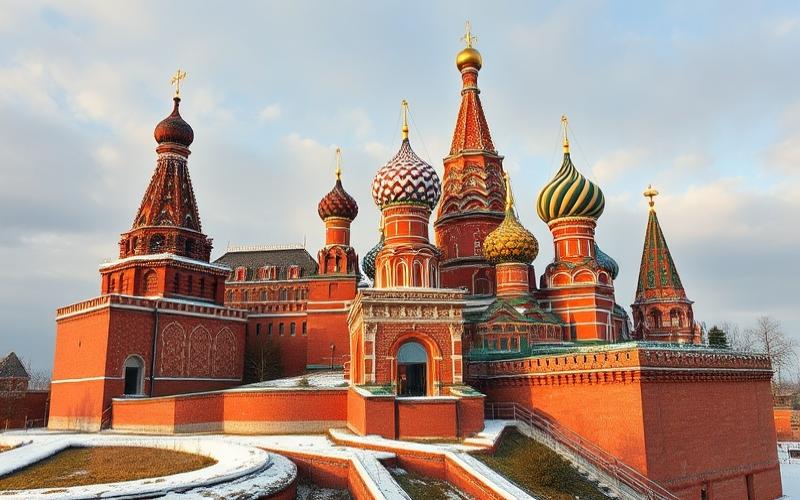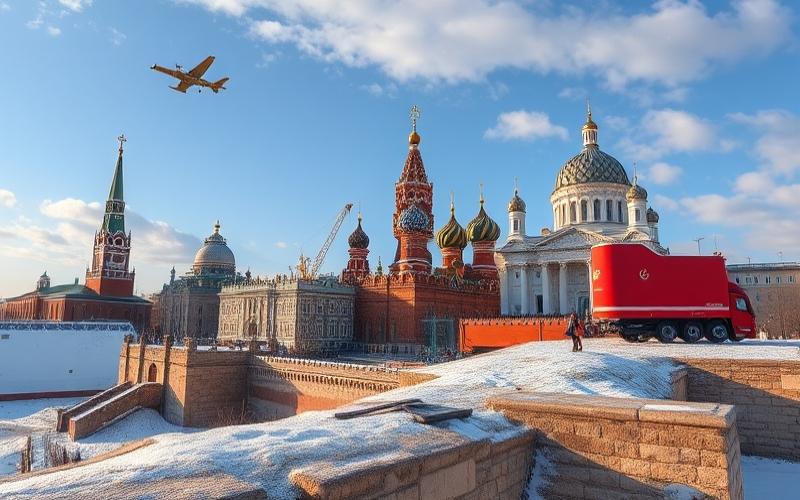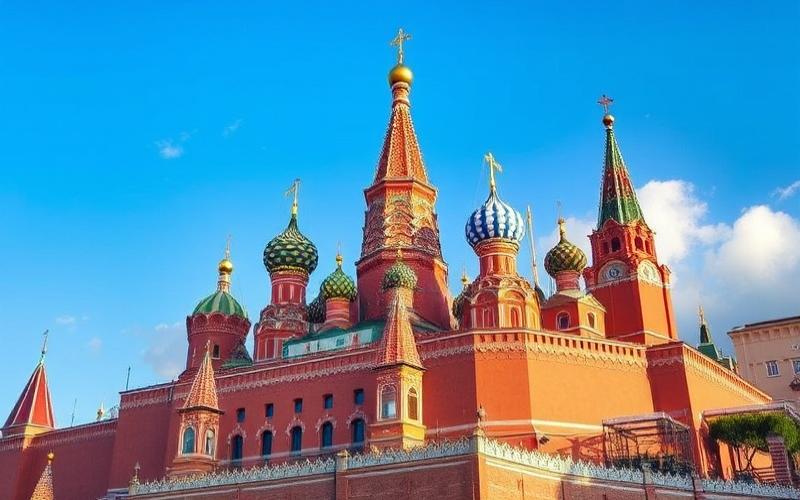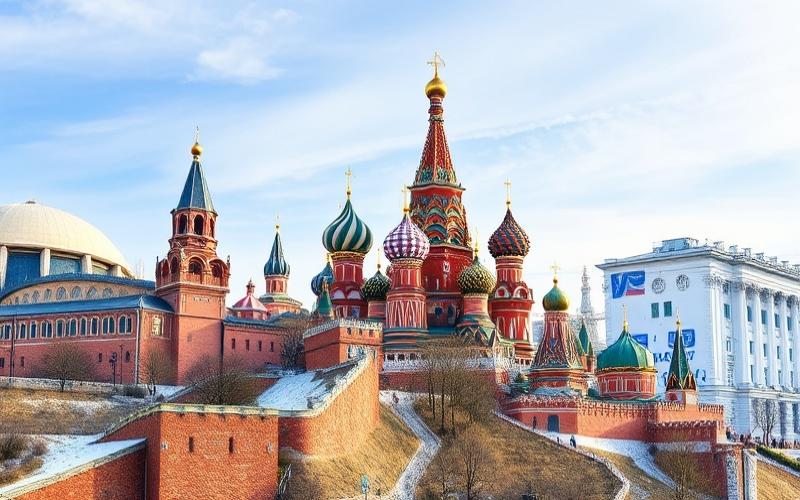
 Published on and written by Cyril Jarnias
Published on and written by Cyril Jarnias
Navigating the maze of Russian taxation can be complex, especially for expatriates who need to familiarize themselves with several essential legal obligations. Among these, income tax and property tax stand out for their importance and potential complexity.
While the Russian system may differ significantly from the tax regimes of many Western countries, understanding these differences is crucial to avoid legal and financial complications. Whether regarding tax rates, possible deductions, or payment procedures, this article will guide you through the intricacies of tax responsibilities that expatriates face, providing clear and concise information to better manage your finances while residing in Russia.
Russian Tax System: Understanding Key Taxes for Expatriates
Individual Income Tax
Definition of Tax Residence: An expatriate is considered a tax resident in Russia if they stay at least 183 days within a consecutive 12-month period. Otherwise, they are considered non-resident.
Applicable Tax Rates:
| Tax Status | Income Tax Rate |
|---|---|
| Tax Resident | 13% (ordinary income) |
| Tax Non-Resident | 30% |
Residents benefit from a reduced rate on most income, while non-residents are subject to a flat rate, typically without the possibility of deductions.
Deductions and Exemptions: Residents may qualify for certain deductions (for example, for education, medical expenses, or purchasing real estate). The income threshold for certain deductions was recently raised to 450,000 rubles.
Property Tax
Tax Base: Property tax is payable by any owner of real estate in Russia, whether resident or not.
Tax Calculation:
- Based on the cadastral value of the real estate.
- The rate varies by region, generally between 0.1% and 2% of the cadastral value.
Reporting Obligations:
- Property owners must verify and, if necessary, correct the cadastral value with local authorities.
- The tax is generally calculated and notified automatically, but expatriates are advised to confirm receipt of tax notices and adhere to payment deadlines to avoid penalties.
Bilateral Tax Treaties and Double Taxation
Russia has signed tax treaties with many countries, including France, to avoid double taxation.
These treaties specify which country has the right to tax each type of income (wages, real estate income, dividends, etc.).
Expatriates should consult the applicable treaty to determine their obligations and avoid double taxation. In case of double taxation, credit or exemption mechanisms exist.
Tax Exemptions and Deductions for Expatriates
Tax resident expatriates can benefit from the same deductions as Russian citizens (medical expenses, education, mortgage interest, etc.).
Some treaties also allow exemption from Russian tax on income already taxed abroad, subject to supporting documentation.
Practical Tips for Tax Management for Expatriates in Russia
- Verify tax residency status annually to ensure the correct tax rate.
- Keep all documentation related to income, deductions, and taxes paid abroad.
- Consult the bilateral tax treaty of your home country to optimize your situation and avoid double taxation.
- Seek assistance from a local tax advisor or international expert for complex cases.
- Strictly comply with reporting obligations, especially for property tax and worldwide income declaration if a tax resident.
- Anticipate legislative changes: Russian taxation evolves rapidly, so it’s important to stay informed about recent reforms.
Key Takeaways
Expatriates in Russia are primarily subject to income tax and property tax. Compliance with tax treaties and reporting obligations is essential to avoid double taxation and penalties. Rigorous management and regular monitoring of legislation are highly recommended.
Good to Know:
Tax residents in Russia pay a fixed income tax of 13%, while non-residents are taxed at 30%; expatriates should check bilateral tax treaties to avoid double taxation. If you own real estate, note that property tax is calculated based on cadastral value and must be declared annually.
Practical Guide to Tax Filing in Russia
Procedures and Deadlines for Income Tax Filing for Expatriates in Russia
- Filing: Expatriates must complete the 3-NDFL declaration for taxable income in Russia. This declaration generally must be submitted by April 30 of the year following the year the income was received.
- Payment: The tax due must be paid by July 15.
- Tax Residence: An individual becomes a tax resident after spending at least 183 days in Russia during a consecutive 12-month period. Before obtaining this status, the non-resident rate applies.
Income Tax Rates Table
| Taxpayer Category | Income Tax Rate | Tax Scope |
|---|---|---|
| Tax Resident | 13% up to 5M RUB/year | Worldwide income |
| Tax Resident | 15% above 5M RUB/year | Worldwide income |
| Tax Non-Resident | 30% | Russian-source income only |
| Tax Non-Resident (dividends) | 15% | Dividends from Russian companies |
| Resident/Non-Resident (prizes, contest winnings) | 35% | Above certain regulatory thresholds |
| Highly Qualified (HQ) | 13% or 15% | Depending on income level and status |
Possible Tax Deductions
- For tax residents only:
- Deductions for purchasing or constructing real estate (up to 2M RUB + 3M RUB in mortgage interest).
- Deductions for medical expenses, education (up to 50,000 RUB/child), donations to approved charities.
- Deductions on real estate sales based on holding period (minimum 1M RUB for property held less than 5 years).
Overview of Property Taxes for Expatriates
- Property Tax (налог на имущество физических лиц): Applies to owners of real estate in Russia, whether residents or non-residents.
- Calculation: Based on the cadastral value of the property. The rate generally ranges from 0.1% to 2% depending on the category and location of the property.
- Payment Deadlines: Property taxes must be paid by December 1 of the year following the tax period.
- Tax Implications:
- Foreign owners are subject to the same rates as Russian citizens.
- Failure to pay may result in penalties, or even seizure of the property.
Summary Table: Property Taxes
| Property Type | Applied Rate | Calculation Base | Payment Deadline |
|---|---|---|---|
| Residential | 0.1% to 0.3% | Cadastral Value | By December 1 |
| Commercial/Other | Up to 2% | Cadastral Value | By December 1 |
Practical Tips for Expatriate Tax Compliance
- Use the official Госуслуги (Gosuslugi) portal and the ФНС (Federal Tax Service) website to submit declarations online, check amounts due, and pay taxes.
- Activate secure email messaging to receive tax notifications.
- Keep all supporting documents (employment contracts, bank statements, property titles, deductible expense receipts).
- Check for the existence of a double taxation avoidance treaty between Russia and your home country to prevent double taxation.
- Seek professional assistance in complex situations (multiple residencies, mixed income, investments).
- Conduct regular self-assessments to anticipate amounts due and avoid delays or penalties.
Strictly adhere to filing and payment deadlines, as late penalties are systematic and can accumulate quickly. Online services facilitate management, but it remains essential to verify the accuracy of submitted information and anticipate potential tax audits.
Good to Know:
Expatriates can declare their income online via the Gosuslugi portal but must ensure they meet the April 30 deadline to avoid penalties. Tax rates range from 13% for residents to 30% for non-residents, and property tax exemptions may apply depending on the owner’s status.
Essential Tips for Managing Your Taxes as an Expatriate in Russia
Practical Tips for Managing Income Tax in Russia for Expatriates
- Verify if you are considered a Russian tax resident: physical presence in Russia for at least 183 days within a 12-month period.
- Tax residents are taxed at a rate of 13% on their worldwide income; non-residents are taxed at 30% on Russian income only.
- Obtaining a tax identification number (INN) is mandatory for any tax or professional procedure.
Example: An expatriate working more than six months per year in Russia becomes a tax resident and benefits from the preferential 13% rate.
Optimizing Deductions and Tax Credits
- Possible deductions:
- Mortgage interest
- Medical and educational expenses
- Voluntary contributions to pension funds
- Tax credits:
- Certain investments (e.g., retirement savings)
- Expenses related to children’s education
Recommendation: Keep all invoices, contracts, and proof of payment to justify your deductions during annual filing.
| Tax Status | Income Tax Rate | Tax Scope |
|---|---|---|
| Resident (>183 days/year) | 13% | Worldwide income |
| Non-Resident | 30% | Russian income only |
Specific Tax Obligations for Expatriates
- Mandatory monthly payment for holders of the “patent” (temporary permit).
- Annual income declaration, even if income is partially or entirely from outside Russia.
- Property owners must declare their locally held real estate and pay associated taxes (property, transport).
Importance of Understanding Tax Residence
Tax residence determines the applicable regime:
If you are not a resident but receive a Russian salary, it will be taxed at the higher rate; conversely, extended stay = more favorable regime.
Filing and Payment Deadlines
- The annual declaration must be filed by April 30, with payment due by July 15.
Practical tip: Use the official Federal Tax Service portal to complete your digital declaration.
Impact of Exchange Rates on Taxation
Ruble/euro conversions can significantly affect:
Concrete example: A salary bonus paid in euros must be converted at the official rate published by the Russian Central Bank on the payment date.
Recommendation: Closely monitor currency fluctuations during final calculations.
Best Practices for Keeping Tax Documents Up to Date
Archive every document related to foreign/Russian income (pay stubs, bank statements).
- Passport & visa
- INN / tax number
- Employment/rental contracts
- Medical/educational receipts
- Annual bank statements
Store these files in a dedicated secure folder (digital + paper copy).
| Available Resources | Description |
|---|---|
| Local tax consultants | Personalized assistance in the local language |
| Expatriate associations | Updated practical information + experience sharing |
| Official Federal Service portal | Secure platform for electronic declarations & payments |
To maximize your rights while remaining compliant, consult a specialized advisor annually or join an active association that regularly disseminates local tax alerts.
Good to Know:
To optimize your taxation in Russia, consider consulting an expert to fully understand tax residency criteria, benefit from local deductions, and track exchange rate fluctuations; remember to file your taxes by April 30 and keep all your documents updated, relying if necessary on expatriate associations to navigate the tax system more easily.
Disclaimer: The information provided on this website is for informational purposes only and does not constitute financial, legal, or professional advice. We encourage you to consult qualified experts before making any investment, real estate, or expatriation decisions. Although we strive to maintain up-to-date and accurate information, we do not guarantee the completeness, accuracy, or timeliness of the proposed content. As investment and expatriation involve risks, we disclaim any liability for potential losses or damages arising from the use of this site. Your use of this site confirms your acceptance of these terms and your understanding of the associated risks.























































